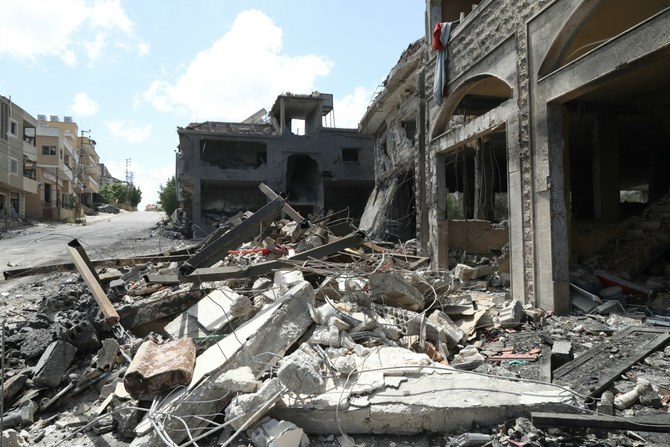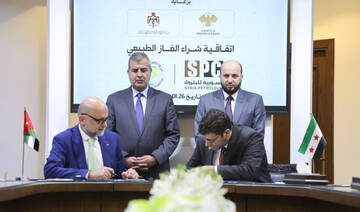LONDON: An Israeli airstrike in Lebanon that killed seven aid workers in March may have been conducted with a US-supplied weapon system, according to an investigation by The Guardian.
The incident claimed the lives of seven paramedics aged 18-25, all volunteers, at an ambulance center in Al-Habariyeh in southern Lebanon on March 27.
It came five days before an Israeli strike in Gaza killed seven aid workers working for World Central Kitchen.
Debris found at the scene in Al-Habariyeh was identified by The Guardian, an independent expert and Human Rights Watch as having belonged to a 500-pound Israeli MPR bomb and a Boeing-made Joint Direction Attack Munition, a system attached to explosives to turn them from “dumb bombs” into GPS-guided weapons.
HRW’s Lebanon researcher Ramzi Kaiss told The Guardian: “Israel’s assurances that it is using US weapons lawfully are not credible. As Israel’s conduct in Gaza and Lebanon continues to violate international law, the Biden administration should immediately suspend arms sales to Israel.”
The US government is legally unable to help or arm foreign militaries where “credible information” of human rights abuses exists, under the terms of the 1997 Leahy law.
A spokesperson for the US National Security Council told The Guardian: “The US is constantly working to ensure defense articles provided by the US are being used consistent with applicable domestic and international law. If findings show violations, we take action.”
But Josh Paul, a non-resident fellow with Democracy for the Arab World Now and a former State Department employee, said: “The State Department has approved several of these (weapons) transfers on a 48-hour turnaround. There is no policy concern on any munitions to Israel other than white phosphorus and cluster bombs.”
He added that JDAMs have been “key items” regularly requested by Israel since the start of the Gaza war.
Secretary of State Antony Blinken will deliver a report on Wednesday to Congress on Israel’s use of American weapons and whether they may have been involved in violations of this or other laws.
Maryland Sen. Chris Van Hollen told The Guardian that the findings from Al-Habariyeh are “deeply concerning and must be fully investigated by the Biden administration, and their findings should certainly be included in the NSM-20 report that is due to be submitted to the Congress on May 8.”
The airstrike on the ambulance center in Al-Habariyeh came without warning before 1 a.m. on March 27. No fighting had been reported in the area.
The victims had been at the center for the night shift, and were named as twin brothers Hussein and Ahmad Al-Shaar, aged 18; Abdulrahman Al-Shaar, 19; Mohammad Hamoud, 21; Mohammad Al-Farouk Aatwi, 23; Abdullah Aatwi, 24; and Baraa Abu Kaiss, 24.
The Israeli military claimed that the strike, which leveled the two-storey building, killed a “prominent terrorist belonging to Jamaa Islamiya,” an armed Lebanese political group with ties to Hezbollah. It did not identify the person by name.
A Jamaa Islamiya spokesman acknowledged that some of the ambulance volunteers were members of the group, but denied that they were part of its armed wing.
Samer Hardan, head of the local Civil Defense center who was among the first responders, told The Guardian: “We examined every centimetre looking for parts of bodies and their possessions. We saw nothing military-related. We knew (the victims) personally, so we could identify their remains.”
Since Oct. 7, 16 medical workers have been killed by Israeli airstrikes in Lebanon, and a further 380 people have died including 72 civilians. Eleven Israeli soldiers and eight civilians have also been killed.
Kassem Al-Shaar, father of Ahmad and Hussein, said he had warned his sons not to volunteer.
“I told them that it was dangerous to do this type of work, but they said that they accepted the risk. I don’t know what Israel was thinking — these were young people excited to help others,” he said.
“My sons wanted to do humanitarian work, and look what happened to them. Israel wouldn’t dare to do what they did if it wasn’t for the US standing behind them.”
















